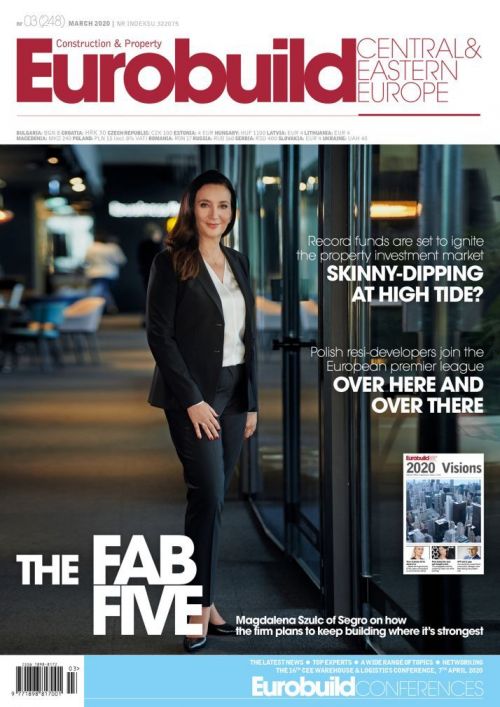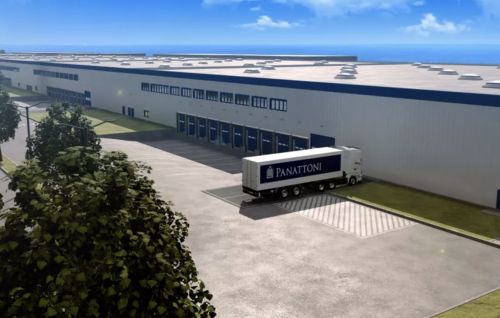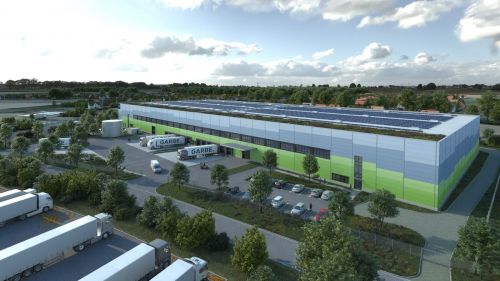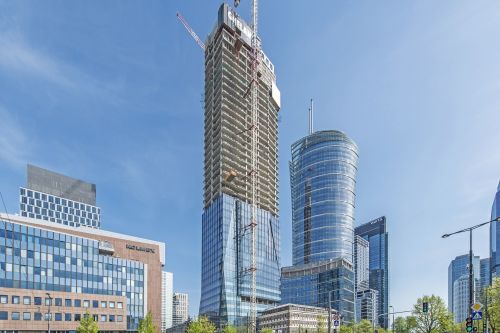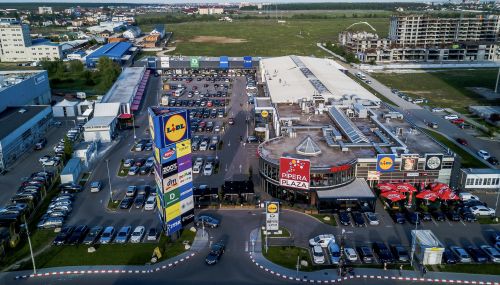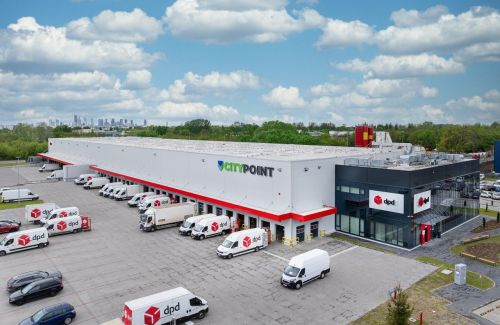The fab five
Feature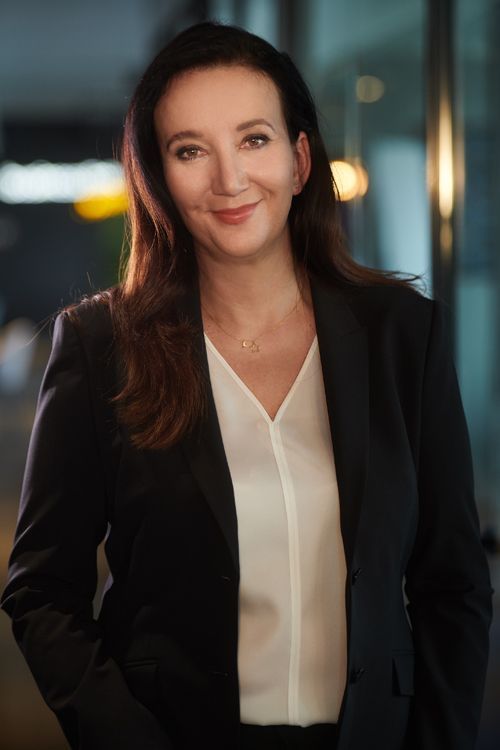
Rafał Ostrowski, ‘Eurobuild CEE’: You have been employed by Segro for fifteen years, back when you were already working for Grontmij, which the company took over at the time to enter Central Europe. What have you accomplished since then?
Magdalena Szulc, Central Europe director, Segro: We have managed to build a large portfolio of real estate in superb locations. These warehouses and production facilities have not become dated during this time. We’ve also built a fantastic team. Forty people are employed in our Polish and Czech branches, many of whom have been with us for a dozen or so years.
And what have you not managed to do?
I think it’s difficult for me to point to something specific here. We’ve succeeded with a great number of things, but we still have an appetite for more. We’re proud of our achievements. Our position at the forefront of the market, with a relatively small but effective team, is a source of great pride.
What’s Segro’s strategy based on?
We build in key logistics locations –not for selling the properties on, but to keep them in our portfolio and continue to manage them for the long-term. We occasionally sell individual assets, but our main goals are different. Therefore, the infrastructure that we are building must meet today’s requirements as well as those in future years. We’re also proud today of what we built fifteen years ago, because we’ve focused on their quality from the very beginning. I’m convinced that there’s no other owner of logistics space that has chargers for electric cars in every park. Two years ago we fitted all our parks with an automatic licence plate reading system, which improves the traffic flow and security. We also, of course, have LED lighting and cloud-based utility monitoring – so our customers can check their electricity and gas consumption at any time. All these systems are very much appreciated by our clients.
Could you give us some kind of figure for how much Segro spends on technology? For example, globally?
New technology does of course make up a significant element of our budget, but because of that our customers can use systems that are constantly being improved, thus their satisfaction increases with each year. So I do not see this as expenditure, but as investment – in the modernisation of our warehouses, in client satisfaction, in safety and in sustainability. Our company does not publish global datafor these expenses, but it can be said that we finance it with our own investment funds.
What are your goals for the next fifteen years?
We are going to develop in a stable manner in key locations. We want a strong team, satisfied clients, low vacancy and relatively good returns from our products. The next few years, therefore, will be marked by the continuation of our strategy and a strong emphasis on new technology at the same time.
What did you buy last year and how much did Segro spend on this?
Last year we finalised the purchase of a plot for the construction of Segro Logistics Park Wrocław, where 81,000 sqm of modern warehouse and production space will be built over 17 ha, almost 30,000 sqm of which is already under construction. We also bought a plot in Żerań, thus we will soon be able to expand Segro Business Park Warsaw, Żerań. We also bought two parks in Wrocław: Segro Business Park Wrocław and Segro Industrial Park Wrocław 2, so we have tripled our space in Wrocław since the beginning of 2019. We also signed a contract for the construction of a total of 13,400 sqm in Łódź, which is to be completed in Q4 2020 and will then become an integral part of Segro Business Park Łódź. The transactions to purchase the finished buildings in Wrocław and the deal in Łódź were carried out by the Segro European Logistics Partnership (SELP). The plot in Wrocław was bought by Segro Poland.
Are you not worried that Poland could become over-supplied? There’s a lot under construction…
I think we have a few years ahead of us before any over-supply situation might arise in Poland. Despite the fact that there’s so much under construction all the time, the market is not yet fully saturated. This can be seen by considering how favourably we compare with our southern neighbours: according to the data for the end of 2019, there is 8.2 mln sqm of warehouse space in the Czech Republic and 10.6 mln inhabitants, whereas in Poland the figure is 17.8 mln sqm of warehousing for 37.8 mln Poles.
Are you building anything speculatively at the moment?
We plan to start the speculative construction of a city warehouse in Segro Business Park Warsaw, Ożarów and are planning to invest further in Żerań. These will be small business units that are rarely secured by pre-lease agreements. We are also finishing the construction of the final 10,000 sqm building in Segro Industrial Park Wrocław, more than 8,500 sqm of which is being built speculatively.
It’s been a very good time for warehouses recently. Will you be able to keep up your rate of 100,000 sqm per year over the next few years?
The warehouse market still has great potential. In the Czech Republic, rents are increasing due to the low availability of land. In Poland, it will take a few more years before potential problems arise.
The warehouse market is bound, however, to slow down after such a record-breaking streak – and this is probably already starting…
Judging by the number of enquiries, we are not seeing any slowdown. We expect the stable growth to continue. New space is needed all the time and business keeps on entering Poland. Production companies are moving their businesses, while courier firms are also developing rapidly because the volume of online orders is still growing.
What are the main sources of demand from your point of view? The production companies you mentioned or e-commerce?
As is reflected in the latest research, a large part of the market, almost a quarter at present, is taken up by e-commerce, which is still growing. As the popularity of online shopping grows and consumer require their orders to be delivered faster, e-commerce is generating much of the demand for warehouse space. Given this, projects designed for urban logistics and for companies that make last-mile deliveries are becoming increasingly important. It’s crucial for them to be able to shorten the supply chain and thus reach the final customer faster and more efficiently. The demand for space is still very high without this, from firms that need facilities for production and logistics – companies are looking for the best space for their businesses, to not only optimise their work but also generate savings.
Segro is active on the five largest markets in Poland: Warsaw, Łódź, Poznań, Wrocław and Upper Silesia. Are you not looking to enter any other cities and regions?
From the point of view of our business, this is not yet the right time to enter other markets. Although the east of Poland is seeing an increase in interest from companies from year to year, this is not yet of a scale that would lead us to consider investing in this region. Furthermore, there’s the question of the ease of recruiting, which, might stop being a driving force behind local development as it is at the moment because continuing progress is being made in automating logistics.
But there are developers now entering these niches in a big way, including markets that are still in their infancy.
That’s right. However, judging by the very low vacancy rate we have –just over 3 pct across Poland – our strategy is working. We’re not saying that we have to be limited to just these five locations for the next fifteen years. We could decide to enter another market, but it would need to have the right scale and potential. We pulled out of the TriCity market because it wasn’t developing at the pace we expected. The deals that were carried out there were relatively small. We want to be present on the largest and most important markets.
Through buying finished products or building new projects?
Both. If good and ready properties appear on the market and they match our portfolio, we are happy to consider them. If we find attractive land, we will buy it. Last May we bought 17 ha in Biskupice Podgórne near Wrocław and in the autumn started a development project there for a client. Recently we also bought a 3.6 ha plot on ul. Annopol in Warsaw’s Żerań district, where we hope to start the construction of new SBU space this year. In Warsaw, apart from big boxes, we are focusing on small business units and city logistics.
Are you now intending to dispose of anything?
We are not planning any sales for this year. We’re thinking about expanding our portfolio rather than selling any of it. We are definitely focused on growth. We’re constantly on the lookout for new land and are preparing the permits for the plots we already have. Further projects are planned in Poznań and Warsaw in the near future.
What about the capital needed for this expansion?
We have secured the financing at the group level, which means that as long as the conditions are met, we should be able tostart development projects without a hitch.
Segro operates in Poland and the Czech Republic. What about other countries in the region? Will you be expanding into other markets?
Our plan is to increase our activity in the Czech Republic, around Prague. There’s still 27 ha to be developed in Segro Logistics Park Prague and we are now working intensively to obtain the building permit.
Aren’t you thinking about entering Slovakia or Hungary?
In the past we were in Hungary. However, we decided not to stay on this market for strategic reasons. We are in the process of selling the land we still hold there and have never built on a large scale in that country. Slovakia, however, is quite a small and saturated market.
What about Romania?
We could take a look at this market in the future, but it doesn’t seem to me that anything about our presence in Central and Eastern Europe is set to change in 2020. It should remain as it now is – Poland plus the Czech Republic.
I hear that this is a special year for Segro because not only is the Polish branch going to have its 15th birthday but the entire company is celebrating its centenary. What are your thoughts on having reached these particular milestones?
I think it’s worth noting that we are probably one of the oldest companies operating in the warehouse sector in Europe. We come from Europe and although we used to have property in the US, Canada and Australia, we are now focused solely on Europe. Segro’s experience is built upon having an extremely long history. The company was founded in Slough near London, where we still own a large amount of real estate and whichis now also the second largest data centre agglomeration in the world, after Silicon Valley. It has to be admitted, though, that we have been lucky to have some good people managing the company who have made some great decisions that have made us into the company we are today.
At Segro since the outset
Magdalena Szulc has been employed by Segro (then Slough Estates) since the end of 2005, when the company began its operations in the region. In 2009 she was promoted to the position of Segro’s Central Europe director. She is responsible for managing the company’s operations in the region and implementing its strategy to develop and expand its logistics portfolio and industrial real estate in key locations. Magdalena has more than twenty years of experience in the real estate sector and holds an RICS certificate.

























